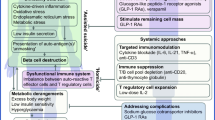Abstract
T-cell growth factor (TCGF) activity was studied in phytohaemoagglutinin (PHA)-stimulated peripheral blood mononuclear cells (PBMC) from 10 type-1 diabetic patients who had been diagnosed within the previous 12 months (group A), from 9 diabetic patients in whom the duration of disease was more than 1 year (group B) and from 12 healthy controls (group C). The effects of indomethacin on PHA-induced TCGF activity and the effects of adherent cells (macrophages) from group A and group C on TCGF production of normal group-matched non-adherent cells (lymphocytes) were also studied. TCGF activity was assayed on TCGF-dependent blast cells and calculated as a stimulation index (SI). TCGF activity in group A (SI 0.86±0.8) was significantly different from that in group B (SI 1.75±1.02;P=0.037) and in group C (SI 1.91±1.29;P=0.023). Following the addition of indomethacin, TCGF SI was 1.35±0.74 in group A, 1.85±0.73 in group B and 2.06±1.19 in group C. The responses to indomethacin were found to correlate with the basal TCGF activity in all subjects (r=−0.48;P=0.006) independently of the disease process studied or its duration. No correlation was found between TCGF activity and parameters of metabolic control (HBA1c and fructosamine). Interestingly, a significant inverse correlation was found between TCGF activity and the required dose of insulin only in group A (r=−0.66;P<0.05). Adherent cells from diabetic patients were found not to inhibit TCGF production. Our results suggest that a defect in T-cell growth-promoting lymphokines could be a relevant feature of type-1 diabetes mellitus in the first months following clinical diagnosis and possibly the lack of detection of this defect in long-standing diabetes may be evidence of ongoing beta cell mass destruction. This defect does not appear to be related to an inhibitory effect mediated by adherent cells or prostaglandins.
Similar content being viewed by others
References
Castano L, Eisenbarth GS, Type-1 diabetes: a chronic autoimmune disease of human, mouse, and rat. Annu Rev Immunol 8:647–679, 1990
Malkovsky M, Sondel PM, Strober W, Dalgleish AG, The interleukins in acquired disease. Clin Exp Immunol 74:151–156, 1988
Miyajima A, Miyatake S, Schreurs J, De Vries J, Arai N, Yokota T, Arai K, Coordinate regulation of immune and inflammatory responses by T cell-derived lymphokines. FASEB J 2:2462–2473, 1988
Thomson AW, Webster LM, The influence of cyclosporin A on cell-mediated immunity. Clin Exp Immunol 71:369–376, 1988
Paul WE, Pleiotropy and redundancy: T cell-derived lymphokines in the immune response. Cell 57:521–524, 1989
Eizrik DL, Strandell E, Bendtzen K, Sandler S, Functional characteristics of rat pancreatic islet maintained in culture after exposure to human interleukin 1. Diabetes 37:916–919, 1988
Mandrup-Poulsen T, Bendtzen K, Dinarello CA, Nerup J, Human tumor necrosis factor potentiates human interleukin 1-mediated rat pancreatic β-cell cytotoxicity. J Immunol 139:4077–4082, 1987
Campbell IL, Cutri A, Wilson A, Harrison LC, Evidence for IL-6 production by and effects on the pancreatic β-cell. J Immunol 143:1188–1191, 1989
Or R, Renz H, Terada N, Gelfand EW, IL-4 and IL-2 promote human T-cell proliferation through symmetrical but independent pathways. Clin Immunol Immunopathol 64:210–217, 1992
Zier K, Leo M, Spielman R, Baker L, Decreased synthesis of interleukin-2 (IL-2) in insulin-dependent diabetes mellitus. Diabetes 33:552–555, 1984
Kaye WA, Adre MNS, Soeldner JS, Rabinowe SL, Kaldany A, Kahn CR, Bistrian B, Srikanta S, Ganda OP, Eisenbarth GS, Acquired defect in interleukin-2 production in patients with type 1 diabetes mellitus. N Engl J Med 315:920–924, 1986
Proud'Homme GJ, Fuks A, Colle E, Seemayer TA, Guttmann RD, Immune dysfunction in diabetes-prone BB rats. Interleukin 2 production and other mitogen-induced responses are suppressed by activated macrophages. J Exp Med 159:463–478, 1984
Yokono H, Kawase Y, Nagata M, Hatamori N, Baba S, Suppression of concanavalin A-induced responses in splenic lymphocytes by activated macrophages in the non-obese diabetic mouse. Diabetologia 32:67–73, 1989
Cantrell DA, Smith KA, Transient expression of interleukin 2 receptors-Consequences for T cell growth. J Exp Med 158:1895–1911, 1983
Gleichmann H, Bottazzo GF, Islet cell and insulin autoantibodies in diabetes. Immunol Today 8:167–168, 1987
Alviggi L, Johmston C, Hoskins PJ, Tee DEH, Pyke DA, Leslie RDG, Vergani D, Pathogenesis of insulin-dependent diabetes: a role for activated T lymphocytes. Lancet II:4–6, 1984
Plaut M, Lymphocyte hormone receptors. Annu Rev Immunol 5:621–69, 1987
Goodwin JS, Webb DR, Regulation of the immune response by prostaglandins. Clin Immunol Immunopathol 15:106–122, 1980
Rincon M, Tugores A, Lopez-Rivas A, Silva A, Alonso M, De Landazuri MO, Lopez-Botet M, Prostaglandin E2 and the increase of intracellular cAMP inhibit the expression of interleukin 2 receptors in human T cells. Eur J Immunol 18:1791–1796, 1988
Sunder-Plaßmann R, Majdic O, Knapp W, Holter W, In vitro and in vivo activated T cells display increased sensitivity to PGE2. Cell Immunol 138:289–299, 1991
Shah U, Karch L, Baker L, Zier KS, Low interleukin 2 synthesis by type 1 diabetics is regulated at pretranslational level. Clin Immunol Immunopathol 61:177–190, 1991
Lee KU, Amano K, Yoon JW, Evidence for initial involvement of macrophage in development of insulitis in NOD mice. Diabetes 37:989–991, 1988
Author information
Authors and Affiliations
Rights and permissions
About this article
Cite this article
Valerio, G., Gasparini, N., Badolato, R. et al. Impairment of T-cell growth-promoting lymphokines in human insulin-dependent diabetes mellitus. Acta Diabetol 31, 52–57 (1994). https://doi.org/10.1007/BF00580762
Received:
Accepted:
Issue Date:
DOI: https://doi.org/10.1007/BF00580762




